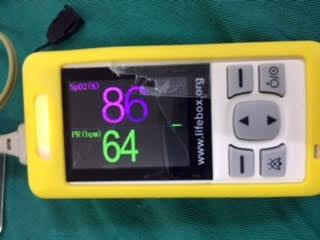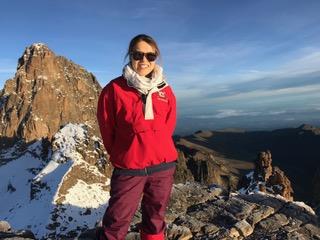Since 2012, Case Western Reserve University’s Master of Science in Anesthesia students have organized a variety of fundraisers to support Lifebox, a non-profit organization making a significant impact in low-resource areas across the globe. CWRU MSA students in Cleveland, Houston, and Washington, D.C. have all taken part in these fundraising endeavors, and, in 2018, one MSA faculty member traveled to Nairobi, Kenya to witness first-hand the impact these resources were having on patients.
About Lifebox
Lifebox is a non-profit organization that develops oximeters and distributes them to low-resource areas. An oximeter (pictured here) is a monitor that clips onto a patient’s finger and alerts the surgeon of changes in a patient’s oxygen level. The device is able to detect even the slightest modulations in oxygen levels, making it an incredibly impactful—and lifesaving—device. In addition to distributing oximeters, Lifebox also offers safety training and basic safety checks to ensure their system and other equipment is implemented and operating properly.
Lifebox was founded by Professor Atul Gawande, who discovered that medical equipment, including oximeters, in low resource hospitals were often dysfunctional or unusable. Without these key devices, the surgeon and the anesthesia care team could not properly monitor patients—a problem that could led to significant complications during surgery.
With the right tools in place, these complications could often be avoided. So, Gawande developed a pulse oximetry system that is low cost, low maintenance, robust, and intuitive. Lifebox oximeters are also built with rechargeable batteries in case of a power failure.
Since 2011, Lifebox has distributed 20,000 oximeters in 113 countries. This large scale, global distribution has led to 20 million safer surgeries. These surgeries have often been followed up with strong testimonials from anesthetists serving low-resource areas.
CWRU MSA and Lifebox
The MSA Network has supported Lifebox through fundraising activities since 2012, raising a few thousand dollars each year to support the organization.
In Houston, the efforts have been annual for the past seven years, including events such as their recent golf scramble hosted by current students for doctors, CAAs, and alumni.
The Cleveland and Washington campuses have also donated to Lifebox, and in 2018, Washington sent Director of Special Projects and clinical instructor, Kim Vuong, CAA (pictured here), to Nairobi to see how the Lifebox oximeters were being implemented in person. Vuong had the opportunity to witness an induction for a pediatric patient, only seven days old at the time, who had been born with spina bifida. She spoke with the attending anesthesiologist before he went into the operating room. Vuong learned that LifeBox is the doctor’s main source of pulse oximetry, and he told her that he trusts it more than the monitors on the anesthesia machine.
The induction went well, and would not have been possible without Lifebox. Following the experience, Vuong told students, “Seeing [LifeBox] in action really touched my heart, and you should all feel proud because it really makes a difference all around the world.”
In addition to supporting LifeBox, CWRU MSA partners with the Kenya Medical Training College to support clinical training and educational initiatives and selected MSA students have the opportunity to complete medical missions through the Washington branch of the Program. Additionally, MSA students have raised funds annually for organizations such as the American Academy of Anesthesiologist Assistants and the Anesthesia Patient Safety Foundation.



